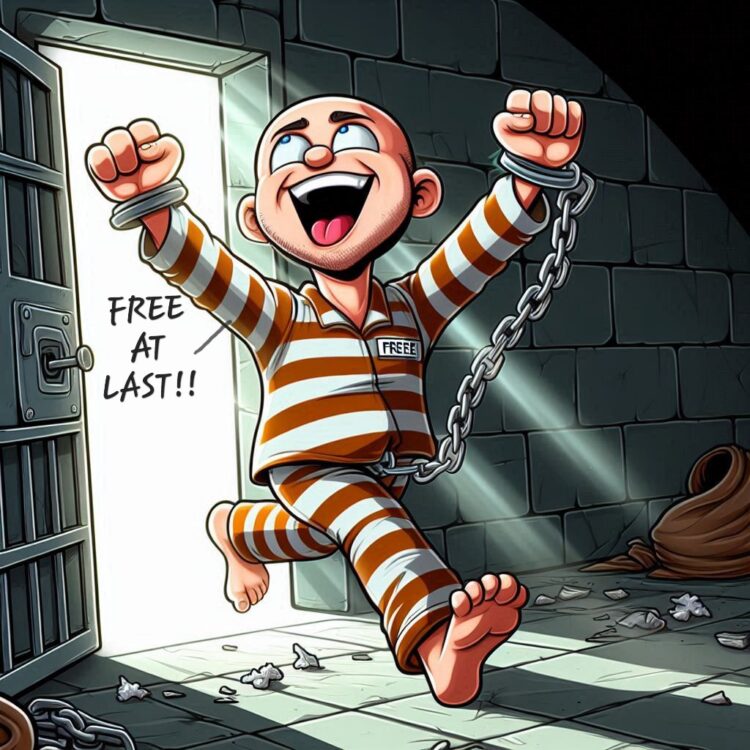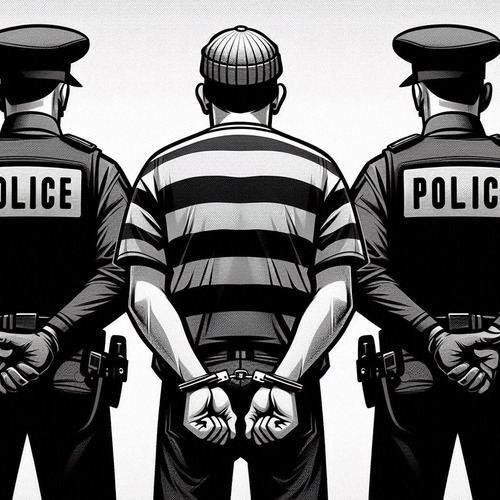Path to True Freedom: Popular Lies vs What Actually Works
Everyone talks about freedom, but most people are enslaved without knowing it.
We’re told freedom means following our hearts, living our truth, and being authentic. But if these promises actually worked, why are anxiety, depression, and emptiness at record highs? Why do people who “do whatever they want” often end up feeling more trapped than ever?
Here’s the uncomfortable truth: the world promises freedom through self-determination, but delivers bondage. Real freedom—the kind that actually satisfies your soul—is found not in following our desires, but in joyful submission to God’s Spirit.
As Jesus said, “So if the Son sets you free, you will be free indeed” (John 8:36).
PATH TO TRUE FREEDOM: THE WORLD’S FALSE PROMISES
“Follow Your Heart”—The Lie of Emotional Autonomy: This might well be the most dangerous advice of our generation. It sounds inspiring, but Scripture tells us the truth about our hearts: “The heart is deceitful above all things and beyond cure” (Jeremiah 17:9).
Think about the prodigal son. He followed his heart straight into a pigpen. His emotions led him away from love, security, and purpose into isolation and shame. Our hearts aren’t reliable guides—they’re corrupted by sin and often lead us toward what ultimately destroys us.
“You Do You”—The Lie of Moral Relativism: This phrase has become a cultural mantra, but it’s built on a fatal assumption: that we can create our own moral framework without consequences. Scripture warns us: “There is a way that appears to be right, but in the end it leads to death” (Proverbs 14:12).
Here’s what really happens when we reject God’s moral law: we don’t eliminate law—we just become slaves to sin instead. As Paul writes in Romans 6:16: “You are slaves to the one you obey.” Choose sin, and sin becomes your master. There’s no neutral ground.
“Live Your Truth”—The Lie of Subjective Reality: This popular phrase suggests truth is personal and malleable. But Jesus declares, “I am the way and the truth and the life” (John 14:6). Truth isn’t subjective—it’s grounded in God’s unchanging character.
When we create our own versions of truth, we create our own prisons. We become trapped in a reality that may feel comfortable but ultimately can’t bear the weight of real life. Self-made truth becomes self-made bondage.
“Be Authentic”—The Lie of Unrestrained Expression: Authenticity sounds noble, but what if your authentic self is broken? Scripture teaches our hearts need guarding, not unleashing: “Above all else, guard your heart, for everything you do flows from it” (Proverbs 4:23).
Authenticity without transformation is just polished rebellion. If we’re naturally selfish, proud, and broken, then authentic self-expression is just authentic sin expression. That’s not freedom—that’s slavery with better marketing.
PATH TO TRUE FREEDOM: WHAT SCRIPTURE TEACHES
Freedom FROM Sin’s Dominion: Real freedom begins with understanding what we’re actually enslaved to. Paul explains in Romans 6:6-7: “Our old self was crucified with him so that the body ruled by sin might be done away with, that we should no longer be slaves to sin—because anyone who has died has been set free from sin.”
Through Christ’s death, sin’s legal claim on us is broken. We’re declared righteous and freed from condemnation. This isn’t just a nice religious idea—it’s the foundation of everything else. Without this freedom from sin’s dominion, all other freedoms are illusions.
Freedom TO Obey God: Here’s where it gets counterintuitive. True freedom isn’t the absence of authority—it’s being freed to obey the right authority. Romans 6:18 says: “You have been set free from sin and have become slaves to righteousness.”
God promises in Ezekiel 36:26-27: “I will give you a new heart and put a new spirit in you; I will remove from you your heart of stone and give you a heart of flesh. And I will put my Spirit in you and move you to follow my decrees and be careful to keep my laws.”
The Spirit enables what the law demands. We’re not just told to be good—we’re given the power to become good.
Freedom THROUGH Submission to the Spirit: This is the great paradox of Christian freedom: submission to God equals true autonomy. Paul writes in Galatians 5:16: “Walk by the Spirit, and you will not gratify the desires of the flesh.”
When we submit to the Spirit, we’re finally free to become who we were created to be. As Romans 8:2 puts it: “The law of the Spirit of life set you free from the law of sin and death.”
WHAT TRUE FREEDOM LOOKS LIKE
Freedom from Self-Worship: When we stop making ourselves the centre of the universe, we discover the peace that comes from trusting God’s wisdom over our own. Isaiah 55:8-9 reminds us: “For my thoughts are not your thoughts, neither are your ways my ways, declares the Lord. As the heavens are higher than the earth, so are my ways higher than your ways.”
This isn’t degrading—it’s liberating. We’re freed from the impossible burden of having to figure everything out ourselves.
Freedom from Performance Anxiety: The gospel frees us from the crushing weight of trying to earn our worth. Ephesians 2:8-9 declares: “For it is by grace you have been saved, through faith—and this is not from yourselves, it is the gift of God—not by works, so that no one can boast.”
When your security rests in Christ’s righteousness rather than your own performance, you’re free to take risks, admit mistakes, and grow without fear of rejection.
Freedom from Fear of Man: Proverbs 29:25 warns: “Fear of man will prove to be a snare, but whoever trusts in the Lord is kept safe.” When you’re living for God’s approval rather than human opinion, you’re free to be bold, honest, and authentic in the best sense.
Freedom from Meaninglessness: Ecclesiastes 12:13 gives us the ultimate purpose: “Fear God and keep his commandments, for this is the duty of all mankind.” When your life has eternal significance, you’re free from the despair that comes from thinking nothing really matters.
PRACTICAL APPLICATIONS
- In Decision-Making: Instead of asking “What do I want?” we start asking “What does God want?” We seek His will through Scripture and prayer. Submit our desires to biblical truth. Trust God’s sovereignty in the outcomes.
- In Relationships: We begin to love others as Christ loved us (John 13:34). To forgive as we’ve been forgiven (Ephesians 4:32). To serve rather than demand to be served. This transforms relationships from power struggles into opportunities for grace.
- In Suffering: Romans 8:28 promises: “God works for the good of those who love him, who have been called according to his purpose.” This frees us from bitterness and despair, allowing us to find joy even in trials (James 1:2-4).
PATH TO TRUE FREEDOM: THE INVITATION
The Cost: Jesus said in Luke 9:23: “Whoever wants to be my disciple must deny themselves and take up their cross daily and follow me.” True freedom requires death to self-will and self-worship.
The Reward: But Jesus also said in Matthew 11:29-30: “Take my yoke upon you and learn from me, for I am gentle and humble in heart, and you will find rest for your souls. For my yoke is easy and my burden is light.” This is freedom that actually satisfies the soul and life that glorifies God.
The Call: The path to true freedom requires three steps:
- Repent of trying to save yourself through self-determination
- Trust in Christ’s finished work on the cross
- Walk in the Spirit’s power daily
The world’s promises of freedom lead to slavery. God’s call to surrender leads to the freedom we’ve been searching for all along.
The choice is ours—but only one path actually works.
PATH TO TRUE FREEDOM: RELATED FAQs
How do we balance Christian freedom with cultural engagement?Theologians Tim Keller and Kevin DeYoung emphasise true freedom enables us to engage culture prophetically rather than defensively. We’re free to appreciate cultural goods while critiquing cultural idols because our identity isn’t threatened by disagreement. This means we can enjoy art, literature, and innovation while maintaining a biblical worldview that transforms how we interact with these gifts.
- What about Christians who seem miserable despite their faith? RC Sproul often noted many Christians live in practical bondage because they haven’t grasped the fullness of their freedom in Christ. They’re still performing for God’s approval rather than living from it. True freedom requires ongoing renewal of the mind (Romans 12:2) and learning to live out of our new identity, not just trying to modify our behaviour through willpower.
- Doesn’t submission to God’s will kill creativity and individuality? John Piper argues God’s sovereignty actually enhances human creativity because it frees us from the pressure to create meaning from nothing. When we understand God delights in diversity within unity, we’re freed to express our unique gifts without fear. The Trinity itself models perfect unity with distinct persons, showing us submission doesn’t eliminate personality but perfects it.
How does this apply to mental health struggles like anxiety and depression? David Powlison and other biblical counsellors in the Reformed tradition emphasise that while mental health issues are real and sometimes require medical intervention, the gospel addresses the ultimate source of human anxiety—our separation from God. Freedom in Christ doesn’t eliminate all emotional struggles, but it provides an unshakeable foundation of identity and hope that can sustain us through them.
- What about people who say they’ve tried Christianity and it didn’t work? Theologians like JI Packer distinguish between trying Christianity as a life improvement technique versus embracing it as a complete worldview transformation. Many people try to add Jesus to their existing framework rather than letting the gospel restructure everything. True freedom comes not from using God to achieve our goals, but from having our goals transformed by God’s purposes.
- How do we handle the tension between God’s sovereignty and human responsibility? Reformed theologians have long wrestled with this “antinomy”—two truths that seem contradictory but are both biblical. Theologians like D.A. Carson explain that God’s absolute sovereignty doesn’t eliminate human responsibility but establishes it. We’re free to make real choices, but these choices occur within God’s sovereign plan, which means we can act boldly without the crushing weight of ultimate responsibility for outcomes.
What’s the difference between Christian freedom and license? Paul Helm and other Reformed ethicists emphasise freedom isn’t the right to do whatever we want, but the power to do what we ought. License says “I can do anything,” while true freedom says “I can do what’s truly good.” The Spirit transforms our “want to” so that we increasingly desire what God desires, making obedience a joy rather than a burden (Psalm 40:8).
PATH TO TRUE FREEDOM: OUR RELATED POSTS
Editor’s Pick

Testament to Design: The Engineering Marvel of Elephants
Picture an African elephant delicately plucking a single acacia leaf with the tip of its trunk, then moments later using [...]

Blue Whales: Mammoth Icons of Intelligent Design
Imagine an animal so massive its heart alone weighs as much as a small car, yet so precisely engineered it [...]

Do Unbelieving Kids Disqualify Church Leaders?
REFORMED PERSPECTIVES ON 1 TIMOTHY 3 AND ELDER QUALIFICATIONS Every pastor knows the heartbreak. A faithful elder who has served [...]
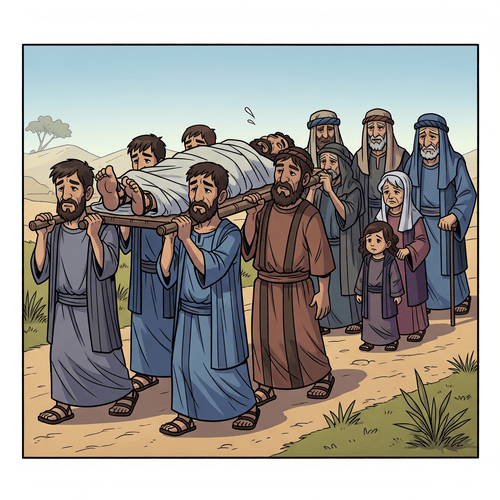
Why Did God Kill Onan? Wasn’t the Punishment Disproportionate?
The story of Onan in Genesis 38 troubles many. Why would God strike down a man for what seems like [...]

Is God Preparing Me for Ministry? How May I Know for Sure?
The question haunts many faithful believers. You’re serving faithfully in your local church, perhaps teaching Sunday school or leading a [...]
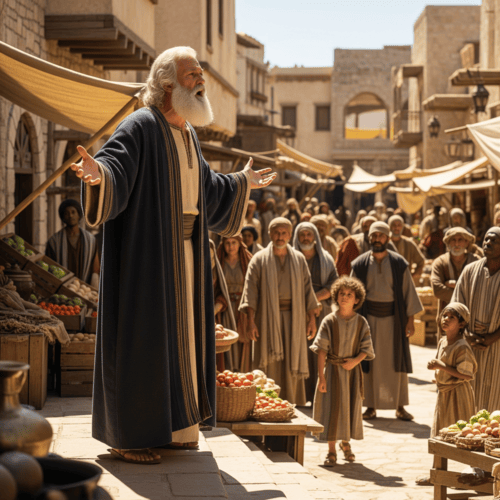
Ephesians 1:13: Was the Spirit’s Indwelling Promised of Old?
When Paul declares believers are “sealed with the promised Holy Spirit” in Ephesians 1:13, one word jumps off the page: [...]
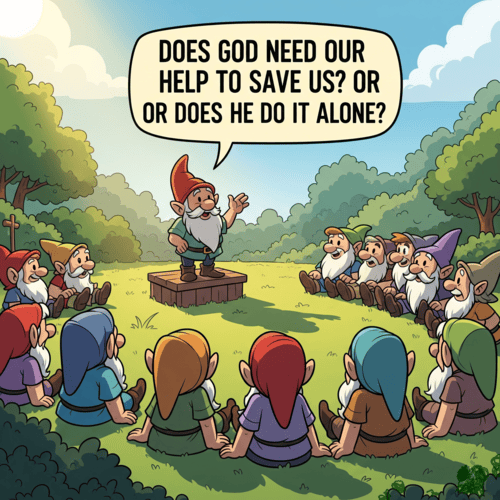
Monergism vs Synergism: Is Salvation God’s Work Alone?
When God saves us, does He do it alone, or does He need our help? The question isn’t mere theological [...]

Was Jesus Abandoned by the Father on the Cross?
WHY WE ANSWER IN THE NEGATIVE “My God, my God, why have you forsaken me?” These words from the cross [...]

Why Do Some Respond to God’s Call While Others Don’t?
THE REFORMED VIEW ON OUTWARD AND INWARD CALLS EXPLAINED Picture this: Two neighbours attend the same church service. They hear [...]

Does Ocean Salt Content Prove a Young Earth?
A COMPELLING LOOK AT MARINE CHEMISTRY AND EARTH’S TIMELINE The Salt Question That Challenges Deep Time: If Earth’s oceans have [...]

